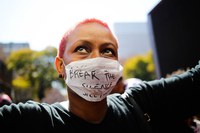
Here's how Uber, local groups are helping GBV victims during lockdown

E-hailing service Uber said on Thursday said it had joined hands with organisations and governments in 16 countries.
Tracey Breeden, head of women’s safety and gender-based violence programmes at Uber, said the company would provide free rides to shelters or places of safety for victims, and the delivery of meals.
“We want to do our part to help survivors access life-saving services and find a safe place to shelter. That’s why we are partnering with domestic violence organisations and local governments in 35 cities across 16 countries to provide 50,000 free rides to shelters and safe spaces, and more than 45,000 free meals,” said Breeden.
Women and Men Against Child Abuse (WMACA) believes the country has experienced an increase of around 37% in gender-based violence compared to the weekly average in 2019.
Police minister Bheki Cele said that police had received 2,320 complaints of gender-based violence in the first week of the lockdown
Kevin Barbeau, executive director of WMACA, said organisations needed to double their efforts to prevent the scourge as most victims had been trapped at home with their abusers.
“A rise in domestic violence is an unintended consequence of lockdowns in countries around the world, a trend which SA has not escaped. Locking people up together raises the potential for abuse, since the victims have nowhere to flee and the abusers may feel especially frustrated by being forced to stay indoors for weeks at a time.
“We need to redouble our focus on prevention of domestic violence and support for victims during a time that is already traumatic and challenging enough for vulnerable people,” he said.
Barbeau said the recent murder and rape of a 14-year-old teenage girl, Simphiwe Sibeko, was a clear example of the level of danger that the most vulnerable members of society faced in these uncertain times.
The organisation and Blue Label Telecoms have since partnered to develop an app to assist those in need.
“The app provides advice about how to identify abuse and what to do if you encounter someone who is being abused. WMACA will monitor reports on the app and follow up with SAPS to ensure every report gets the necessary attention,” said WMACA.
It can be used to report abuse, bullying, suspicious people, police case neglect, or missing children. If the user needs emergency assistance, it provides their location as well as the location of the nearest police station.
Bianca Lima-Boekhoud, group head of transformation at Blue Label Telecoms, said the app was a valuable educational tool which would help empower young people and women to understand their rights.
WMACA offered the following safety tips for people who feel unsafe at home during the lockdown:
For those with access to the internet and a phone
- Phone the government hotline: 0800 150 150
- GBV command centre: 0800 042 8428
- Childline toll free hotline: 0800 055 555
- Another helpful resource for vulnerable families is rAInbow. Developed by UK-based company AI for Good, in partnership with the Soul City Institute for Social Justice and Sage Foundation, rAInbow is a chatbot that uses artificial intelligence (AI) to chat with users and provide accurate information on domestic violence.
- Know where the nearest phone is. If you have a mobile phone, try to keep it with you.
- Keep any important and emergency telephone numbers with you.
For those who cannot access phones or the internet:
- Identify neighbours you can trust and where you can go in an emergency. Tell them what is happening and ask them to call the police if they hear sounds of a violent attack.
- Pack an emergency bag for yourself and your children in case you need to flee. Hide it somewhere safe (for example, at the house of a neighbour or friend). Try to avoid mutual friends or family members.
- Plan your response to crisis situations that may arise in your home. Think about the different options that may be available to you.
